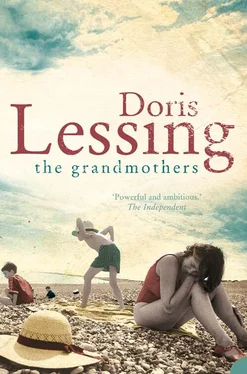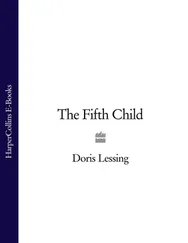Doris Lessing - The Grandmothers
Здесь есть возможность читать онлайн «Doris Lessing - The Grandmothers» — ознакомительный отрывок электронной книги совершенно бесплатно, а после прочтения отрывка купить полную версию. В некоторых случаях можно слушать аудио, скачать через торрент в формате fb2 и присутствует краткое содержание. Жанр: Старинная литература, на английском языке. Описание произведения, (предисловие) а так же отзывы посетителей доступны на портале библиотеки ЛибКат.
- Название:The Grandmothers
- Автор:
- Жанр:
- Год:неизвестен
- ISBN:нет данных
- Рейтинг книги:3 / 5. Голосов: 1
-
Избранное:Добавить в избранное
- Отзывы:
-
Ваша оценка:
- 60
- 1
- 2
- 3
- 4
- 5
The Grandmothers: краткое содержание, описание и аннотация
Предлагаем к чтению аннотацию, описание, краткое содержание или предисловие (зависит от того, что написал сам автор книги «The Grandmothers»). Если вы не нашли необходимую информацию о книге — напишите в комментариях, мы постараемся отыскать её.
The Grandmothers — читать онлайн ознакомительный отрывок
Ниже представлен текст книги, разбитый по страницам. Система сохранения места последней прочитанной страницы, позволяет с удобством читать онлайн бесплатно книгу «The Grandmothers», без необходимости каждый раз заново искать на чём Вы остановились. Поставьте закладку, и сможете в любой момент перейти на страницу, на которой закончили чтение.
Интервал:
Закладка:
Hundreds of young men who had seen no more of India and the Indians than what they observed of life on the roads, in the bazaars, or the networks of amenities that surrounded the army - servants, Eurasian girls who were spoken of by the sahibs and memsahibs as if they were so much dirt, or the Indian soldiers in the army who intermeshed hardly at all with the white army, or the cleaners at the camp - these young men left India without regrets, at best thinking that the war had given them a glimpse of what travel might be. They filed on to the ship that was to take them away from a continent they saw as thoroughly unwholesome and unsavoury. But this voyage could not be as terrible as that other; only half the length, and they were going home. Home, which shortened the distance. It was rough, and hot, particularly through the Suez Canal, and in the Bay of Biscay, as was to be expected, the waves chopped and churned and tossed them about and they were sick, but home was in sight - and there they were, at last, the white cliffs, as Vera Lynn had promised.
‘How was your voyage?’ asked his mother, and James, ‘Oh, not so bad, could have been worse.’
On a dirty and rattling train James travelled through a land without light, so it seemed, a thin drizzly dark and faint blurs of light, and then in his home town, the street lights were dim and the windows, if not blacked out, showed parsimonious glimmers, and he was watching his feet as he walked. When he switched on the light on the stairs his mother said, ‘Please, only when you have to,’ and on the landing a faded notice said, ‘Save Electricity - Don’t Switch It On’, His old room, where he dropped his kitbag unopened, to get down faster to his parents, was small, well, it always had been, but it was so dingy. The supper was in the kitchen because leaving the oven door open heated the room; once his mother had made a point of eating ‘properly’ in the dining-room. The three sat around the table which had a vase of autumn leaves on it, and Mrs Reid boasted that she had got ‘under the counter’ liver from the butcher, in honour of his coming home. She served three thin lengths of brown meat like leather straps, with onions and potatoes. James had told himself, having grown up, that his father was not an old man, but though he was not much over fifty Bill Reid was an old man now, with a fuzz of white hair around a red face. James’s mother was polite to him and smiled all the time. Her embrace when he arrived seemed embarrassed rather than warm. ‘You have filled out,’ she said. But she could not stop smiling and tried to blink away tears when he noticed them. His father, silent as ever, kept pushing the dishes of vegetables at him, nodding Help yourself, but while his eyes were moist too, he could not talk, even say, ‘Thank God you’re home,’ so the dishes of vegetables had to do instead. ‘Have some potatoes,’ said Mrs Reid. ‘At least we’ve got plenty of those.’ In the dim kitchen the three sat eating and smiling, and felt so powerfully for themselves and for each other that it was a relief when James said he was tired. I le left his mother sitting under the light, the radio switched on, crocheting something, and his father went to the pub.
‘He’s got to tell his mates you are home,’ she said.
James stood at his bedroom window and looked down at the darkened town. In India lights glared and blared, shadows moved blackly as the sun did, defining the hours. He had returned to a lightless land.
He at once got a job at the Town Hall, but not starting at the bottom, because of his years administrating Camp X. It was a good job. He stayed in his room a lot, reading, ate the meals that were less even than the meagreness he had been brought up with: rationing suited his mother’s nature; she enjoyed eking out the bacon ration and making the meat ration stretch. The drear and dark of post-war England - well, he was home, and that was all that mattered. He thought of India and did not like his memories. Except for Jack Reeves, with whom he had exchanged addresses, and Donald, and Colonel Grant - and of course, the little child of those two visits - he did not care to remember India, which was not so much a place as an emotion of holding on, sticking it out.
Alone in his room, the door locked, he read his letters to Daphne. It took hours. He did not see how he could send them: suppose they were intercepted? Suppose her husband … no, he would give them to her himself. When’ Just as soon as the war’s enormous damage had been absorbed and everything had settled down.
He met Donald, who was already well up the ladder that would take him into politics. He visited Jack Reeves, and Jack came to him fora weekend. He joined a club and played some modest and likeable cricket. And he married Helen Gage, who had been a landgirl and enjoyed it: he could see, when he told her how he had longed for the end of the war, she did not understand, though she said she had too. She was a pretty, healthy young woman, tough and strong after her years of hard labour, and his mother was delighted. She had been afraid he would not marry, or marry late, she had not known why, but that had been her secret dread. She had been afraid of another silent man thrown out by war, a man who could not speak of what he had known. James was not communicative: he did not have much to say about India. But in the ordinary affairs of life he was easy enough - normal. His wife would not have to wake in the night beside a man thrashing about in a nightmare.
He told Helen that he had had a fling in Cape Town and that a child had resulted. She was married. When travelling was easier, lie was going out to see. In fact, he had gone up to London to ask about travelling within a week of getting home. There wouldn’t be air travel for ordinary people for some time, or only for people who could pull strings: did he have strings to pull? No, so he would have to wait. It was not only the soldiers and airmen who were still coming home as the ships became available but everybody was on the move or wanted to be, after years of being stuck because of the war, or because of new jobs abroad. He could reckon on a good wait. Months, no: years, more like it.
It had already been years. He had learned how to wait. Love like theirs would keep, existing as it did out of time. There would be Daphne’s white arms welcoming him and the years in between would be forgotten.
Helen asked him how old his love child would be by now. Generous of her to use the word, and he kissed her for it, before telling her the exact age: years, months, days, Helen had had no cause until now for so much as a moment’s doubt: this was her first shock and it was a bad one. She had touched something deep and dangerous, and she knew it: this was like one of those doors you carelessly open in a dream and find a house, a world, a landscape, wider, larger, brighter or darker than the one you know. Almost, she broke off the engagement then and there. His face as he told her was one she had not seen before, set, inward-looking, into a world she was not going to share. This moment put in high relief other feelings she had bad about James, not easily articulated. She did not try now. She thought, But I’ve got him, haven’t I? She hasn’t. He says he loves me. And she certainly was very fond of him. She had had her adventures too. Wartime is productive of ‘flings’, not to mention broken hearts. Her heart had not been broken, or anything like it, but one of the men she had loved, if briefly, had been killed in Normandy She knew she had got over it, but while she confessed to James, she broke down, much to her surprise, and wept, finding herself enclosed in his arms. She was weeping not so much for a man but for lost men, her lover, her brother (lost at sea), a cousin (at Tobruk), and then there was a friend, a fireman, killed in the Blitz - unlived lives.
Читать дальшеИнтервал:
Закладка:
Похожие книги на «The Grandmothers»
Представляем Вашему вниманию похожие книги на «The Grandmothers» списком для выбора. Мы отобрали схожую по названию и смыслу литературу в надежде предоставить читателям больше вариантов отыскать новые, интересные, ещё непрочитанные произведения.
Обсуждение, отзывы о книге «The Grandmothers» и просто собственные мнения читателей. Оставьте ваши комментарии, напишите, что Вы думаете о произведении, его смысле или главных героях. Укажите что конкретно понравилось, а что нет, и почему Вы так считаете.












